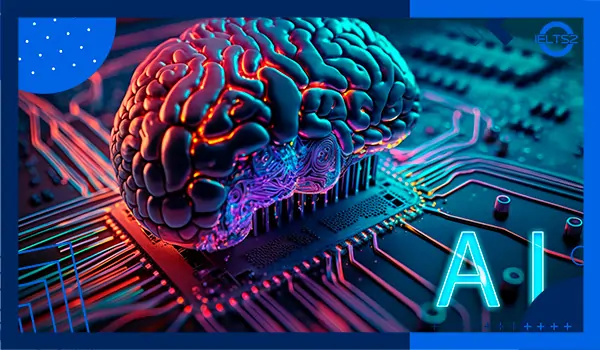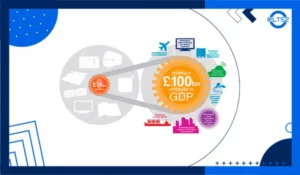نمونه سوالات اسپیکینگ آیلتس درباره هوش مصنوعی (پارت 1 2 3)
در این بخش بیش از 20 مورد از نمونه سوالات اسپیکینگ آیلتس نمره 9 درباره “موضوع هوش مصنوعی” را با هم میبینیم. این مجموعه از آخرین سوالات گزارش شده از سنترهای برگزار کننده آیلتس در ایران و خارج از کشور مربوط به پارت 1، 2 و 3 می باشند و شانس تکرار آن ها در آینده بالاست. در ادامه مطلب همچنین نکات گرامری، لغات و دلایل دریافت نمره 9 را به طور مشخص توضیح داده ایم تا راهنمایی برای علاقمندان باشد. 1000 نمونه سوالات اسپیکینگ آیلتس با جواب PDF پارت 1 2 3 پیشنهاد بعدی ما به شما عزیزان است.
نمونه سوالات اسپیکینگ آیلتس درباره موضوع هوش مصنوعی (پارت 1)
1. Have you ever used any AI tools or applications in your daily life?
Yes, I often use AI tools in my daily routine. For example, I rely on Google Assistant to set reminders and control smart devices. I also use Grammarly, which uses AI to check my grammar and writing. Even the personalized recommendations I get on YouTube or Netflix are powered by AI. It’s amazing how AI has seamlessly become part of everyday life, making tasks more efficient and saving time without us even realizing it.
2. Do you think AI makes life easier or more complicated?
In my opinion, AI definitely makes life easier. It automates repetitive tasks, provides quick solutions, and even improves communication through tools like automatic translation. Of course, there are concerns about privacy and job loss, but overall, it enhances convenience and productivity. When used responsibly, AI can significantly improve our quality of life, helping us focus on more creative or meaningful activities instead of routine work.
3. Are you worried about the development of artificial intelligence?
To some extent, yes. While AI has enormous potential to improve healthcare, education, and industry, there’s always the risk of misuse. Deepfakes, surveillance, and biased algorithms are serious concerns. I believe strict regulations and ethical guidelines are essential to ensure AI develops in a way that benefits society rather than harms it. With proper control, the benefits will far outweigh the risks, but we can’t afford to be careless.
4. Would you like to learn more about AI in the future?
Absolutely. AI is shaping the future, and understanding it is crucial, even for people outside the tech field. I’d love to take a course or attend a workshop that explains how AI works and how it can be applied responsibly. As it becomes more integrated into our lives, having at least a basic knowledge will empower me to use it wisely and maybe even contribute to the conversation about its ethical use.
5. What’s your favorite example of AI technology?
My favorite AI technology is probably ChatGPT. It’s a language model that can write essays, answer questions, and even help with coding. What I find fascinating is how naturally it mimics human conversation. It’s a perfect example of how AI can support education, creativity, and productivity. It’s like having an intelligent assistant available 24/7. This kind of tool represents the positive side of AI – making knowledge more accessible to everyone.
6. Do you think AI will replace teachers or doctors in the future?
I don’t think AI will replace teachers or doctors entirely. These roles involve emotional intelligence, ethical decisions, and human interaction, which AI can’t fully replicate. However, AI can assist them by analyzing data, providing diagnostic suggestions, or offering customized learning experiences. So, instead of replacement, I see AI as a powerful partner that can make professionals more effective, not obsolete.
7. Have you read or watched anything about AI recently?
Yes, I recently watched a documentary on Netflix called “The Social Dilemma.” It explores how AI algorithms are used in social media to manipulate users’ attention and behavior. It was eye-opening and made me more aware of how subtly AI influences our decisions. I think documentaries like this are important because they encourage critical thinking and help people understand the power and dangers of AI technologies.
8. How do people in your country feel about artificial intelligence?
The opinions vary widely. Some people are excited about the convenience and progress AI brings, especially in healthcare and education. Others are worried about job security and data privacy. In general, there’s growing curiosity and a desire to learn more about it. However, I think there’s also a need for public education, so people can make informed decisions and not just fear the unknown aspects of AI.
9. Do you use AI for studying or working?
Yes, I use AI tools regularly when studying. For example, I use apps like Quizlet, which use AI to suggest study plans based on my performance. I also use ChatGPT to clarify complex concepts or help brainstorm ideas for essays. These tools save time and make learning more engaging and personalized. In the workplace, AI is becoming more common for scheduling, customer support, and data analysis.
10. Would you trust an AI to drive a car for you?
That’s a tough one. I think I would, but only under specific conditions. If the AI has been thoroughly tested and proven to be safer than human drivers, I’d be open to it. But I’d still want to have some control or override options. Trusting AI in such high-stakes situations takes time and transparency. As the technology evolves and becomes more reliable, I think trust will grow naturally.
نمونه سوالات اسپیکینگ آیلتس درباره موضوع هوش مصنوعی (پارت 2)
Describe a time when you saw or used artificial intelligence. You should say:
what it was
where you saw or used it
what it did
And explain how you felt about it.
Band 9 Answer:
Last year, I had an incredible experience using artificial intelligence for the first time in a truly impactful way. I was preparing for an important university presentation and needed help organizing my ideas and checking my grammar. A friend recommended a tool called ChatGPT, which is an AI-powered writing assistant. I decided to give it a try.
At first, I typed in a few rough ideas, and to my surprise, the AI instantly provided a well-organized outline based on my input. It even suggested better vocabulary and sentence structures that made my presentation sound more professional. I also used it to double-check some technical terminology, and it provided explanations that were easy to understand, even for someone without a strong background in the subject.
What impressed me most was how human-like its responses were. It felt like I was talking to a very knowledgeable tutor who was always available. It didn’t just correct my mistakes; it helped me learn from them. I ended up using the tool throughout the entire process—from brainstorming to final editing.
The result? I received top marks for my presentation and my professor even complimented me on the clarity and structure of my arguments. More importantly, I gained confidence in my ability to write and present effectively, all thanks to the assistance I received from this AI tool.
I felt both amazed and a little concerned. On one hand, the technology was incredibly helpful and made my life easier. On the other hand, I realized how powerful AI can be, and it made me think about how such tools should be used ethically. Overall, I was inspired by the potential of AI to transform education and make learning more accessible. It was a clear example of how artificial intelligence, when used wisely, can be a valuable ally in our academic and professional lives.
نمونه سوالات اسپیکینگ آیلتس درباره موضوع هوش مصنوعی (پارت 3)
1. How do you think AI will change the job market in the next 10 years?
AI will significantly reshape the job market. While it might eliminate some repetitive or manual jobs, it will also create new opportunities in areas like data science, AI ethics, and automation. Jobs will shift from labor-intensive tasks to roles requiring creativity, emotional intelligence, and problem-solving. People will need to reskill or upskill to stay relevant. In short, AI won’t destroy jobs—it will change them, emphasizing the importance of lifelong learning and adaptability.
2. Should schools teach students about artificial intelligence?
Definitely. AI is no longer a futuristic concept; it’s part of everyday life. By introducing students to AI early, schools can prepare them for the future job market and encourage responsible usage. Teaching AI also helps students understand how technology works, which promotes digital literacy and critical thinking. Even basic knowledge about AI can empower students to use it ethically and creatively in their careers, rather than being passive users of complex technology.
3. What are the ethical concerns related to AI?
AI raises several ethical concerns. One major issue is bias in algorithms, which can lead to unfair treatment or discrimination. There’s also the risk of data misuse, as AI systems often require access to personal information. Deepfakes and surveillance are further threats to privacy and democracy. Additionally, there’s the question of accountability—if an AI system makes a mistake, who is responsible? These concerns highlight the urgent need for ethical guidelines and transparency in AI development.
4. Do you think AI can understand human emotions?
Currently, AI can recognize emotions to a limited extent, using facial expressions or speech patterns. However, truly understanding emotions requires empathy, context, and cultural awareness—traits that AI lacks. AI might simulate empathy, but it doesn’t actually feel or comprehend emotions. While emotion-detection technology is improving, it’s still far from replicating genuine human emotional intelligence. Therefore, while useful in customer service or therapy apps, AI’s emotional understanding is still quite superficial.
5. In what ways is AI improving education?
AI is revolutionizing education by personalizing learning experiences. Adaptive learning platforms can identify a student’s strengths and weaknesses and tailor content accordingly. AI tutors provide instant feedback, while tools like ChatGPT help with writing and research. Teachers also benefit from automated grading and lesson planning. Overall, AI makes education more accessible, efficient, and inclusive, especially for students with different learning needs. However, it’s important to balance technology with human interaction to maintain engagement and empathy.
6. Should decisions in fields like law or medicine be made by AI?
AI can support decision-making in law or medicine by analyzing data and providing insights, but it should not replace human judgment. These fields require ethical reasoning, empathy, and an understanding of context, which AI lacks. For example, a doctor must consider a patient’s emotions, not just symptoms. Similarly, a judge must weigh moral implications, not just legal precedents. So, AI can assist, but final decisions should always involve human professionals.
7. Do you think governments should regulate AI development?
Absolutely. Without regulation, AI could be misused or cause unintended harm. Governments should implement policies to ensure fairness, transparency, and accountability in AI systems. Regulations can prevent discrimination, protect privacy, and promote ethical standards. Moreover, they can encourage innovation by creating a safe and trustworthy environment. It’s essential that regulation keeps pace with technology so that AI benefits society without threatening fundamental rights or freedoms.
8. What impact might AI have on human relationships?
AI could have both positive and negative effects on human relationships. On one hand, it can connect people through language translation, social platforms, and smart assistants. On the other hand, excessive reliance on AI might reduce face-to-face interaction and emotional bonding. Some people may even develop emotional attachments to AI, which raises psychological concerns. Therefore, while AI can enhance communication, it’s important to maintain genuine human connections and emotional intimacy.
9. Can AI be creative like humans?
AI can generate creative content like art, music, or writing, but it lacks original thought or emotion. Its “creativity” comes from patterns in data rather than inspiration or experience. While AI-generated works can be impressive, they are often derivative. True creativity involves personal expression and a unique perspective, which AI does not possess. So, while AI can mimic creativity, it doesn’t truly innovate in the way humans do. It’s a powerful tool, but not a replacement.
10. What do you think is the future of AI?
The future of AI is both exciting and uncertain. AI will likely become more integrated into daily life, helping in areas like healthcare, education, and transportation. We might see smarter virtual assistants, self-driving cars, and more intuitive interfaces. At the same time, we’ll face challenges like job displacement, ethical dilemmas, and digital inequality. The key is to guide AI’s development responsibly, focusing on human well-being and sustainability. With the right balance, AI can be a force for good.
عوامل مؤثر در کسب نمره ۹ در پاسخها درباره موضوع هوش مصنوعی
دامنه لغات گسترده: استفاده از واژگان پیشرفته مانند “derivative,” “intuitive,” “accountability,” “sustainability,” “emotional intelligence” در پاسخ به سوالات اسپیکینگ موضوع هوش مصنوعی در بالا نشاندهنده دانش واژگانی بالا است.
تنوع گرامری: ساختارهای پیچیده مانند شرطی نوع دوم، جملات معلوم و مجهول، و استفاده از قیود و صفات پیشرفته، سطح گرامر را نشان میدهد.
پیوستگی منطقی: استفاده از linking words مثل “however,” “on the other hand,” “therefore,” “in short” باعث روانی و انسجام پاسخ شده است.
مثالهای خاص و ملموس: پاسخ سوالات اسپیکینگ آیلتس برای موضوع هوش مصنوعی در بالا با مثالهای واقعی مثل ChatGPT، Netflix یا Grammarly همراه شده که باعث باورپذیری و عمق بیشتر پاسخها میشود.
توسعه کافی پاسخها: در هر پارت، پاسخها به خوبی گسترش یافتهاند، بدون تکرار و در حد کلمههای توصیهشده برای نمره 9.
بیان واضح و طبیعی افکار: پاسخها بسیار طبیعی، بدون تلاش برای حفظ مصنوعی ساختارها، و در عین حال کاملاً آکادمیک هستند.
مطالبی برای مطالعه بیشتر
مزایا معایب هوش مصنوعی در جامعه (رایتینگ آیلتس تسک 2)
لغات آیلتس موضوع هوش مصنوعی (Artificial Intelligence)
سوالات آیلتس درباره تکنولوژی (رایتینگ و اسپیکینگ)
هوش مصنوعی IELTS AI Checker (تحلیل اسپیکینگ و رایتینگ)
تعیین سطح رایگان اسپیکینگ ❤️
نمونه سوالات اسپیکینگ آیلتس درباره “موضوع هوش مصنوعی” پارت 1 2 3 را به همراه سمپل های نمره 9 آن ها با هم دیدیم. در ادامه نمونه سوالات دسته بندی شده اسپیکینگ آیلتس پیشنهاد آخر ما به دوستان گرامی هست. این نمونه سوالات اسپکینگ از پرتکرار ترین تاپیک های این بخش و همچنین جدیدترین موضوعات می باشند. این مجموعه توسط یکی از سایت های معتبر و فعال آیلتس تنظیم شده است. همچنین برای تعیین سطح و تعیین رایگان نمره اسپیکینگ و دریافت جدید ترین سمپل های نمره 9 در کانال تلگرام اسپیکینگ ما همراه باشید و به ادمین برای تعیین نمره اطلاع دهید.






